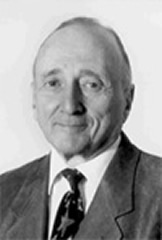

|

|
IN MEMORIAM
Milton Miller
Professor of Psychiatry & Biobehavioral Sciences
UC Los Angeles
1927 – 2005
Milton Howard Miller died at his home in San Pedro on April 20, 2005, due to complications of a brain tumor. Professor emeritus of psychiatry and biobehavioral sciences at the David Geffen School of Medicine at UCLA, he was a leader in American psychiatry and served as a chairman of psychiatry for more than 40 consecutive years. Throughout his life, Dr. Miller was committed to academic, cross-cultural and public psychiatric programs and was dedicated to delivering quality mental health care to poor and minority communities. In public and academic systems, it is rare for someone to maintain their energy, passion and focus for decade after decade. However, throughout his long and distinguished career, interacting with patients, designing systems for care of the patient with chronic mental illness, and teaching what it means to be a clinician were the central interests of Milton Miller.
A talented student and musician, he graduated from the University of Indiana at age 19 and University of Indiana School of Medicine at 23. Dr. Miller completed a residency in psychiatry at the Menninger Clinic in Topeka, Kansas. After serving two years as a captain in the Air Force, he joined the faculty of the University of Wisconsin, where his rise was meteoric. He went from instructor to professor in six years and became chairman of the Department of Psychiatry at age 34. Dr. Miller built a distinguished department at Wisconsin and wrote on topics ranging from psychopharmacology to existential philosophy.
In 1978, Dr. Miller moved to UCLA to become chairman of psychiatry at the Harbor-UCLA Medical Center. He transformed Harbor into an outstanding training and research center while strengthening its ties with the Los Angeles County Department of Mental Health (LACDMH). Dr. Miller served as a Deputy Medical Director for LACDMH until the time of his death, and fought ceaselessly to provide quality care to the mentally ill of Los Angeles. He fervently believed that the University should never abdicate its responsibility to the poor and underserved and was proud to state that he never turned away anyone from his door.
He received numerous awards including the Sherman M. Mellinkoff Award at UCLA School of Medicine (he was the only psychiatrist to win this award), the I. Arthur Marshall Distinguished Alumnus from Menninger School, the Asian/Asian-American Award from the American Psychiatric Association, and teaching awards from psychiatric residents at Harbor-UCLA and King/Drew Medical Center. Over his distinguished career, Dr. Miller trained thousands of psychiatrists, psychologists, social workers, and nurses from the United States and around the world. Many of his past students are now leaders in mental health administration and teaching.
He was instrumental in organizing the UCLA Academic Partnership, a group comprised of the leaders in the Department of Psychiatry and Biobehavioral Sciences at UCLA/NPI who meet regularly with the leaders of the LACDMH and the chairs and training directors of the Veterans Administration and other affiliated institutions making up the vast Department at UCLA. The Partnership has led to the University providing resources, teaching, and expertise in treating serious mental illness into community-based clinics where this type of teaching was non-existent.
Dr. Miller served as teacher and mentor to thousands of psychiatrists and non-psychiatric clinicians throughout the United States, Canada, and parts of Asia. These include not only residents, but also psychiatrists in the community, visiting scholars from Taiwan, China, Japan, and Korea, psychologists, social workers, nurses, and past students who continue to turn to him for advice on clinical and administrative topics. For many years, he taught small seminars to beginning residents: one on interviewing techniques and one on existential psychiatry. These were intensely personal seminars where trainees were challenged to think about and then re-think their approaches to patients and to their work. Many graduates who are now practicing clinicians or academicians have said that although they did not quite see the relevance of some of their time with Dr. Miller, in retrospect, his wisdom may have been the most important and lasting legacy of their residency.
Dr. Miller was a superb clinician who continued to be involved in the direct care of patients throughout his career. To see him talk with patients and their families was to see a master clinician at work; even the most frightened and guarded patient would ultimately respond to him. He displayed a genuine interest in the patients, their culture, their inner experience and their concerns of the moment. He was particularly interested in seeing patients with their families, believing that the more traditional one-to-one psychotherapy leaves out a significant dimension of patients’ lives. For many years, he sought out a psychiatric resident to be his co-therapist when he saw couples or families in treatment. This was a unique, intimate, and experiential learning vehicle for residents and one that is rarely offered in a training setting.
He was often asked to consult on difficult clinical cases even by his senior faculty colleagues. In these situations, he had an uncanny ability to perceive a new aspect to the case, often identifying an obstacle in the doctor-patient relationship. He also was frequently called to see family members of prominent individuals in local and national settings. He was a doctor's doctor, one of the very few who always responded immediately, empathically, and wholeheartedly. He will be greatly missed.
His wife Harriet, his sons Bruce and Jeffrey, his daughter Marcie, and nine grandchildren survive Dr. Miller.
Fawzy I. Fawzy
Ira M. Lesser